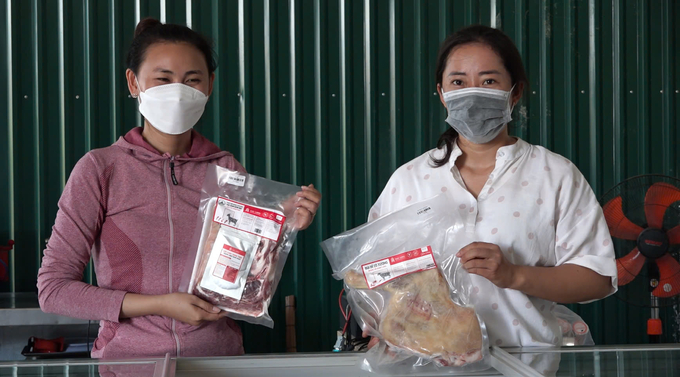May 18, 2025 | 04:21 GMT +7
May 18, 2025 | 04:21 GMT +7
Hotline: 0913.378.918
May 18, 2025 | 04:21 GMT +7
Hotline: 0913.378.918

The establishment of a supply chain in goat and sheep farming requires participation from the business community. Photo: PC.
The sustainable development of the goat and sheep farming industry requires Ninh Thuan Province to establish supply chains that connect farmers with slaughterhouses, trading businesses, processing and storage facilities, and distribution channels. Consequently, this initiative will gradually introduce local goat and sheep products to supermarkets, retail outlets, and daily meals, in addition to facilitating future export activities.
Additionally, the province must focus on promoting the restructuring of the livestock sector toward farm-based models in conjunction with pasture planning, commodity production programs, and industrial processing and consumption.
Accordingly, the province must develop suitable mechanisms and policies to form these linked supply chains and attract investment from large-scale businesses in the development of goat and sheep farming. This focus will maintain and expand Ninh Thuan’s unique livestock sector, in addition to establishing the “Ninh Thuan goat” certification mark and the “Ninh Thuan sheep” brand.
According to Truong Khac Tri, Deputy Director of the Ninh Thuan Province's Department of Agriculture and Rural Development, stakeholders within the local agricultural sector have provided consultations for the Provincial People’s Committee and coordinated with relevant agencies to maximize support through various programs and projects. Furthermore, the Provincial People's Committee has instructed local commercial and policy banks to enhance loan support for livestock farming activities.
Deputy Director Tri suggested local livestock farmers adapt accordingly as local breeding conditions change. They must move away from the traditional free-range farming practice and adopt a managerial farming method. Moreover, they should balance herd numbers to match their production capacity and create high-quality products for consumers and the market.
“It is necessary to form cooperative groups consisting of local livestock households and connect them with the business community to create a stable source of raw materials for the market. At the moment, Ninh Thuan Province is developing a goat and sheep supply chain with the aim of exporting these products. The agricultural sector is actively supporting this effort. In the immediate future, we will assist cooperatives and cooperative groups in partnering with businesses to further develop the farming of horned livestock species,” Deputy Director Tri added.

Goat and sheep meat products from Nhat Thanh Food Co., Ltd. have received a 3-star OCOP certification. Photo: PC.
Policies aimed at attracting investment in livestock (providing breeds, feed, veterinary medicine, and off-take contracts) will enable Ninh Thuan to establish a comprehensive supply chain that encompasses slaughter, processing, and distribution. This approach aims to establish stronger linkages in production, consumption, and branding for local livestock products.
In addition, the government has implemented policies to support organizations, individuals, and businesses involved in livestock farming, slaughtering, processing, as well as the trading of goat and sheep products. This support will promote investment and collaboration between farms and livestock households, thereby creating an efficient and closed production-consumption chain.
Tran Nguyen Khac Huy, Chairman of Nhat Thanh Food Co., Ltd., reported the company is developing a Halal slaughtering process with the aim of meeting export requirements for Muslim markets in West Asia. Notably, the company's initiative is compatible with a project approved by the province.
Chairman Huy noted that only a small number of Vietnamese companies are reputable in offering Halal certification services, despite their abundance. Obtaining Halal certification for goat and sheep meat products is challenging due to the humane requirements stipulated by Islamic law.
“We are currently working with consultants to design a suitable Halal process. The company has also submitted a proposal to the Provincial People’s Committee to expand land for building a dedicated Halal production line. This line must be separate from others in terms of breeding, slaughtering, and quarantine,” emphasized Chairman Nguyen Khac Huy. He added that Halal regulations require the slaughter of goats and sheep to be conducted by Muslims, and the company’s location near a Muslim community facilitates the recruitment of this specialized workforce.
The adoption of unified Halal standards across the Halal industry will have a positive and undeniable impact on Vietnam’s economic growth. Moreover, it encourages innovation and fosters a new era of global partnerships.
Vietnam's integration into the global Halal ecosystem requires strict compliance with OIC/SMIIC standards. This level of dedication will help Vietnam sustain the Halal industry's long-term development.
Translated by Nguyen Hai Long

(VAN) In the face of counterfeit and imitation products, Khanh Hoa Salanganes Nest Company hopes for the prompt completion of the legal framework, strict enforcement against violations, and protection of the bird’s nest brand.

(VAN) Japan's efforts to lower the price of rice through the release of its stockpile may finally be making some progress, albeit at a snail's pace.

(VAN) U.S. tariffs are not only a 'shock', but also an opportunity for Vietnamese businesses to renew their mindset toward comprehensive development.

(VAN) As Bac Giang lychee enters the harvest season, Minister Do Duc Duy expects that the fruit will contribute greatly to agricultural exports due to standardized production and deep processing.

(VAN) Consumers have shown a preference for free-range eggs, but those farming systems are more vulnerable to biosecurity risks like bird flu.
/2025/05/09/5701-1-184335_301.jpg)
(VAN) Vietnam’s eel exports nearly doubled thanks to a mud-free farming model, opening up new prospects while still facing numerous barriers related to international standards.

(VAN) Minister Do Duc Duy warned that if production is not professionalized and supply chains are not transparent, the U.S. market could become a growth bottleneck.